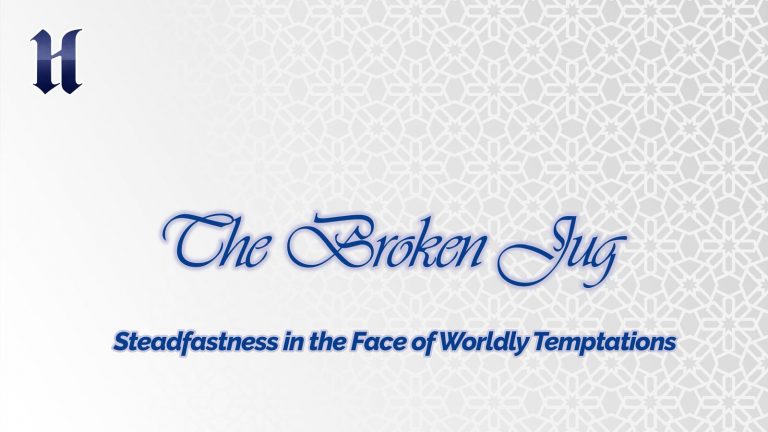İçindekiler
The primary obligation of a believer is to consistently enhance their connection with the Almighty. The worth of servitude correlates directly with the strength of one’s bond with God. The more connected you are, the more robust your servitude becomes. Thus, your heart should be an admirer of that Eternal Beauty that never fades away, your tongue should continuously utter His praises, and your limbs should be devoted to actions pleasing to Him. If your heart, tongue, and other faculties remain steadfast with Him, you will become a recipient of, and experience, abundant blessings. [1]
As the Sufis say, one without a spiritual routine will not experience the downpour of Divine blessings; those who neglect regular devotions and remembrances will be deprived of the grace and abundance that come from them.
It is extremely challenging for hearts that have hardened, emotions that have become numb, and spirits that have dried up to remain standing without collapsing. Therefore, a person must be a “hel min mezid” (Is there not more, My Lord?)[2] hero in strengthening their connection with the Almighty. With an insatiable heart, one should constantly ask, “Is there not more, My Lord?” and strive to deepen their faith in Allah, knowledge of Him, and love for Him.
In the path of faith, divine knowledge, and divine love, one should revisit everything they have heard, read, and known up to that day, along with its background, and delve even deeper into them. Those who remain stagnant and allow themselves to be complacent, may – God forbid – eventually lose their way. Those who do not make a continuous effort to strengthen their relationship with Allah and consistently move toward Him may be drawn to the allure of transient, ephemeral things.
In contemporary times, the primary reason why some individuals are falling apart and stranded on the path is their weakness in their relationship with their Lord. Just as objects that remain inert and motionless either decay or are scattered in different directions, individuals who do not make an effort to draw closer to Allah either decay or are swept away. Because they cannot maintain their course, one day they may be in the right place, and the next day, they may be seen at the wrong doors. Today, they may utter certain words, and the next day, they may say things that contradict them. Those who allow themselves to be complacent in strengthening their faith and knowledge find it difficult to maintain their own paths; they enter others’ paths and are carried away by their currents. If you do not wish to experience such fluctuations and desire to continue on the straight path, you must be active in strengthening your connection with Allah.
The Relationship between Nearness to Allah and Humility
On the other hand, a person progressing on the path of servitude to Allah should not consider their progress sufficient, especially to the extent of falling into the trap of self-admiration or “‘ujb.” They should seek refuge in Allah from such feelings. A believer becomes humble in proportion to their closeness to Allah and the strengthening of their connection with Him. As humility increases, the value of the person in the sight of Allah also rises. As one’s faith, knowledge, and love increase, so does their passion and enthusiasm. Such a person expresses their servitude to Allah through standing, bowing, prostrating, and supplicating. However, no matter how much worship and obedience they offer, they are aware that they cannot fulfill the right of servitude. Therefore, they humbly acknowledge, “We have not worshipped You as You truly deserve, known You as You truly deserve, and thanked You as You truly deserve,” and reflect on these sentiments constantly. Even if they manifest their servitude in the Divine presence five times a day with complete devotion, expressing their acts of worship and praise, they consider their own servitude woefully inadequate in comparison to the majesty of Allah.
An individual who recognizes their smallness in the presence of Allah, lowering the wings of humility to the ground, will be elevated by Allah as they humble themselves. On the other hand, one who perceives themselves as great and plunges into the sea of arrogance will be submerged by Allah as they become more arrogant. There is no quality other than humility that brings a person closer to Allah, just as there is nothing else that distances them from Allah as much as arrogance. As expressed in a sacred saying, majesty and grandeur are attributes exclusive to Allah’ (Abu Dawood, libas 27). A person who claims these attributes, whether aware or unaware, is asserting characteristics specific to Divinity and, in this sense, associating partners with Allah.
Those who See Greatness in Humility
Humility, modesty, and meekness[3] were distinguished qualities of the Pride of Humanity, the Prophet Muhammad (peace and blessings be upon him). Likewise, the Rightly Guided Caliphs, who emulated his example, reached the peaks of humility and modesty. The supplication found in the book “El-Kulûbu’d-Dâria” attributed to Hazrat Abu Bakr as-Siddiq (may Allah be pleased with him) exemplifies the depth of his humility:
Grant Your grace, O Lord, to this servant, whose provisions are very meager,
Even though bankrupt, with devotion he has returned to Your door, O Majestic!
His sins are immense; Please forgive those sins, grant mercy.
His state is pitiable, and he is a sinful servant who is abased.
His rebellion upon rebellion, mistake upon mistake,
Yet from You, grace upon grace, and mercy most generous.
As numerous as the grains of sand are his sins, he seeks refuge in You,
Please show Your forgiveness and erase them, O Beautiful One!
My condition is such that there is hardly a worthy deed in the book of my life,
My sins are abundant, and my devotion is very meager.
Heal the wounds of my soul and provide a remedy for my needs,
You are the True Healer, and I am a heart-sick and humble servant.
All these words are attributed to Hazrat Abu Bakr, who entered the radiant presence of the Pride of Humanity (peace and blessings be upon him) at the inception of revelation, accompanied him during the Thawr sovereignty[4], and safeguarded him like a shield, never parting from his side throughout his life. Speaking with the title of “As-Siddiq”, Hazrat Abu Bakr is expressing these sentiments. The services rendered to Islam during the caliphates of Hazrat Abu Bakr and Hazrat Umar are comparable, equal, to those in the Umayyad and Abbasid periods and even to the accomplishments of the Ottoman Empire over six centuries. With the permission and grace of Allah, they accomplished deeds in twelve years that would transcend twelve centuries.
All these words are attributed to Hazrat Abu Bakr, who entered the radiant presence of the Pride of Humanity (peace and blessings be upon him) at the inception of revelation, accompanied him during the Thawr sovereignty, and safeguarded him like a shield, never parting from his side throughout his life. Speaking with the title of ‘As-Siddiq,’ Hazrat Abu Bakr expresses these sentiments. The services rendered during the caliphates of Hazrat Abu Bakr and Hazrat Umar are not only comparable but superior to those in later periods, encompassing the Umayyad, Abbasid, and Ottoman eras spanning over six centuries. With the permission and grace of Allah, they accomplished deeds in twelve years that would transcend twelve centuries.
Despite achieving significant milestones, Hazrat Abu Bakr humbly views himself as a bankrupt person without capital in his prayer above. He earnestly questions and laments his rebellion and sins. This stance serves as a reminder for those who consider themselves something to be humble and reflective.
Indeed, individuals with true capital exhibit such behavior. These are individuals with a sound disposition, temperament, and an array of commendable attributes, humbly bowing down like ripened ears of wheat. On the contrary, there are those lacking these qualities, firmly grounded. When such individuals attempt to emulate and soar high like birds, they often end up crashing to the ground. History is replete with such examples, and you may have encountered similar instances and individuals in your own surroundings. You might have observed how those who appear arrogant and elevated eventually experience a downfall. The destiny of today’s arrogant individuals is likely to follow a similar pattern.
Indeed, Hazrat Umar (may Allah be pleased with him) attributed the drought to his own sins, praying, “O Allah, do not destroy the Ummah of Muhammad because of my sins.” When he went out for the rain prayer, he would hold the hands of Abbas, the uncle of the Prophet (peace and blessings be upon him), and supplicate to Allah using him as an intermediary. He lived according to the means of the people, sustaining himself with what the common people lived on and ate. When he went to receive the keys to Masjid al-Aqsa in Jerusalem, he traveled with a commoner and shared a single camel among them, taking turns riding. In times of need, he would stop on the road and mend his torn clothes. Was he doing these things out of necessity? No. During Hazrat Umar’s caliphate, there were forty thousand reserve horses kept only for emergency use in Damascus. The state resources were quite extensive. However, he lived a very modest life, considering that he had no right to excess in public wealth, meticulously contemplating his actions and always thinking about the accountability before Allah.
Indeed, luminaries like Hazrat Abu Bakr and Hazrat Umar, as they spread the wings of humility, were elevated by Allah, and through them, the peaceful banner of Islam fluttered everywhere. The Divine name and the name of the Prophet Muhammad echoed like a flag in distant lands because of them. People from different cultures and nations flocked to Islam. Through them, Allah brought to heel the two most powerful states of that time, the Byzantine and Sassanian Empires. Upon observing the arrival, stance, and general state of Hazrat Umar, the Jewish scholars of Jerusalem remarked, “This is the person to whom we will hand over the keys of Masjid al-Aqsa!”
Allow me to say this: Where are they, and where are we? Those who claim to love them and follow in their footsteps should perhaps reconsider their own actions.
The situations of Caliphs Hazrat Osman and Hazrat Ali were not different from those of their predecessors. Hazrat Osman was a very wealthy individual. Imagine that, before the Battle of Muta, he donated 500 loaded camels to support the army. He was among the wealthiest in both Mecca and Medina. However, he lived a very simple life, resting in the Prophet’s Mosque on a pile of sand he made like a pillow. He lived not in palaces but in an ordinary, humble house. To the extent that ruthless criminals entered his home easily, and while he was reciting the Qur’an, they martyred him.
Hazrat Ali embraced faith in the Pride of Humanity while still a child and earned his place among the pioneers. Throughout his life, he continued to progress and reached the heights. The Prophet Muhammad (peace and blessings be upon him) had so many appreciative words about him that if collected, they would make a book. However, Hazrat Ali, remembered by titles like Haydar-i Kerrar, Damad-i Nebi, Fatih-i Hayber, and Reisü’l-Evliya[5], expressed the following in a poetic ode:
Oh Allah! If You forgive only the virtuous,
Can the transgressors who succumb to their desires find forgiveness?
Oh Allah! When I remember Your grace, all my fears dissipate,
As my sins assail my mind, tears stream down from my eyes.
Yes, they were truly great. They adorned their greatness with humility. As they excelled in humility, Allah elevated them. With each ascent, they added another mark of humility to their own names. Their achievements, their way of life, and their self-perception are evident. If you look at the prayers in “el-Kulûbu’d-Dâria,” you will witness that Shah-i Geylani, Imam Ghazali, Hasan Shazeli, Muhammad Bahauddin Naqshband, and many other true friends of Allah constantly humbled and zeroed themselves. When we evaluate ourselves in comparison to them, we cannot help but say, “Where are they, and where are we, who claim to be Muslims!”
Let’s bring the words to the contemporary speech made by Bediüzzaman. He says, “O my ostentatious carnal soul! Do not be proud of your services to God’s religion. As stated in a Prophetic Tradition, God may strengthen this religion by means of a dissolute person. You are not pure, so regard yourself as that dissolute person. Purge yourself of self-admiration and pride by considering your service and worship as thanksgiving for God’s past favors to you, a duty required by your humanity and a consequence of your being God’s work of art.”[6] Who says this? It is a person who carried the revival movement of an era on their shoulders and became an inspiration to millions with their written works. All these mean that the closer a person is to Allah, the deeper their humility and self-effacement become. What befalls someone approaching Allah is to nullify oneself. Deceiving oneself by the applause and admiration of the people or by the positions and ranks one represents is like casting a shadow on the Divine Being.
May the Almighty, in the measure He has informed us of Himself, make us humble and modest, and grant us success in knowing our limits! Amen.
[1] The phrase “The Ascendants Rose with Humility” implies that those who have risen and elevated their social and spiritual status did so with a humble and modest demeanor. It suggests that their advancement was accompanied by a sense of humility.
[2] In the context of servitude to God spirituality, the phrase ‘hel min mezid’ can be expressed as: In the culmination of serving, loving, and praising the Creator, someone who tastes the outpourings of Divine grace and blessing may say, ‘Oh my Lord, let me receive, and You, keep giving, and give even more; grant increase in abundance and excellence.’ It emphasizes the continuous pursuit of more in one’s connection with the Almighty.
[3] Meekness here is like humility and modesty, or a sense of unworthiness before the Divine standards. It conveys the idea of the individual humbly recognizing their limitations and unworthiness in the presence of the Divine, which is in harmony with the theme of seeking forgiveness, grace, and mercy of God.
[4] The esteemed scholar respectfully terms the cave as “Thawr sovereignty.” It served as a refuge for Prophet Muhammad (pbuh) and Abu Bakr as-Siddiq during their escape from Quraysh search parties before the migration. This cave witnessed miraculous events that strengthened the faith of the Islamic community. It became a sanctuary for three days and nights, with Allah’s intervention protecting them through a spider’s web and a pigeon nesting at the entrance, thwarting the soldiers from discovering them. As the search team approached the cave, Prophet Muhammad (pbuh) consoled Abu Bakr, saying, “Do not be sad; Allah is with us,” a phrase later revealed as a verse (Quran, 9:40). During their stay, the Prophet likely shared spiritual secrets and insights with Abu Bakr, prompting scholar Gülen to fittingly name it the “Thawr sovereignty.”
[5] Ali ibn Abi Talib is a significant figure in Islamic history and was the cousin and son-in-law of the Prophet Muhammad (pbuh). Hazrat Ali is revered for his close relationship with the Prophet Muhammad, his deep knowledge of Islam, his bravery, his commitment to justice, and also as the forefather of the awliya descending from the lineage of the Prophet (pbuh). As a result, he is consistently lauded with titles, much like the scholar mentioned here.
[6] Bediüzzaman S. Nursi, Words, 26th Word, p.492






